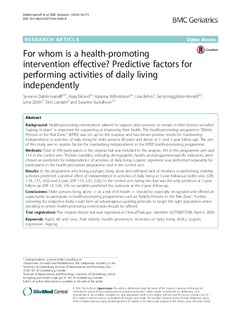For whom is a health-promoting intervention effective? Predictive factors for performing activities of daily living independently
Dahlin-Ivanoff, S.; Eklund, K.; Wilhelmson, K.; Behm, L.; Haggblom-Kronlof, G.; Gustafsson, S.; Zidén, L.
Journal article

Åpne
Permanent lenke
http://hdl.handle.net/11250/2477814Utgivelsesdato
2016Metadata
Vis full innførselSamlinger
Originalversjon
Dahlin-Ivanoff, S., Eklund, K., Wilhelmson, K., Behm, L., Haggblom-Kronlof, G., Zidnn, L., . . . Gustafsson, S. (2016) For whom is a health-promoting intervention effective? Predictive factors for performing activities of daily living independently. (Report). BMC Geriatrics, 16(1). 10.1186/s12877-016-0345-8Sammendrag
Background Health-promoting interventions tailored to support older persons to remain in their homes, so-called "ageing in place" is important for supporting or improving their health. The health-promoting programme "Elderly Persons in the Risk Zone," (EPRZ) was set up for this purpose and has shown positive results for maintaining independence in activities of daily living for older persons 80 years and above at 1- and 2 year follow-ups. The aim of this study was to explore factors for maintaining independence in the EPRZ health-promotingprogramme. Methods Total of 459 participants in the original trial was included in the analysis; 345 in the programme arm and 114 in the control arm. Thirteen variables, including demographic, health, and programme-specific indicators, were chosen as predictors for independence of activities of daily living. Logistic regression was performed separately for participants in the health promotion programme and in the control arm. Results In the programme arm, being younger, living alone and self-rated lack of tiredness in performing mobility activities predicted a positive effect of independence in activities of daily living at 1-year follow-up (odds ratio [OR] 1.18, 1.73, 3.02) and 2-year, (OR 1.13, 2.01, 2.02). In the control arm, being less frail was the only predictor at 1-year follow up (OR 1.6 1.09, 2.4); no variables predicted the outcome at the 2-year follow-up. Conclusions Older persons living alone -- as a risk of ill health -- should be especially recognized and offered an opportunity to participate in health-promoting programmes such as "Elderly Persons in the Risk Zone". Further, screening for subjective frailty could form an advantageous guiding principle to target the right population when deciding to whom health-promoting intervention should be offered. Trial registration The original clinical trial was registered at ClinicalTrials.gov. Identifier: NCT00877058, April 6, 2009.
